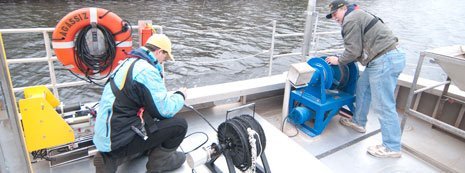Coupling of experimental and theoretical investigations for discovery of new fate of organic degradation pathways in the aqueous phase advanced oxidation processes
Document Type
Presentation
Publication Date
8-2014
Abstract
The lack of a holistic management plan combined with uncertainty about the adverse human health and ecological impacts of trace amounts of known and emerging organic compounds have raised public concerns about water. These issues also present major challenges to next generation water treatment utilities dealing with de facto and planned wastewater reuse. Advanced oxidation processes that produce highly reactive hydroxyl radicals are promising technologies to control trace amounts of organic compounds. Although the initial fate of hydroxyl radical induced reactions with diverse organic compounds have been studied, the mechanisms that produce intermediate-radicals and stable-byproducts are not well understood. Significant barriers remain in our understanding of complex multi-channel elementary reaction pathways embedded in peroxyl radical bimolecular decay that produce identical intermediate-radicals and stable-byproducts. We employed quantum mechanical theoretical calculations to determine the elementary reaction pathways and associated reaction rate constants for the aqueous phase uni-/bi-molecular decays of peroxyl radicals. We first optimized the structures of reactants, transition states, and reactants for the aqueous phase peroxyl radical reactions using the combination of the ab initio quantum mechanical methods with the implicit solvation models. Second, we established the free energy profiles as a function of reaction coordinates based on the theoretically calculated aqueous phase free energies of activation and reaction. Third, from the experimentally obtained overall reaction rate constant for the peroxyl radical reaction, we assigned the partial reaction rate constants for each elementary reaction of peroxyl radical decay. Finally we extended these procedures to the entire reaction mechanisms initiated by hydroxyl radicals and validated the elementary reaction pathways with the experimental observations in literature. We found that availability, number, and position of C-H bond(s) played significant roles in the formation of intermediate-radicals and stable-byproducts in the aqueous phase advanced oxidation processes.
Publication Title
ACS National Meeting 2014
Recommended Citation
Minakata, D.,
&
Rouleau, M. D.
(2014).
Coupling of experimental and theoretical investigations for discovery of new fate of organic degradation pathways in the aqueous phase advanced oxidation processes.
ACS National Meeting 2014.
Retrieved from: https://digitalcommons.mtu.edu/cee-fp/27


Publisher's Statement
Published by the American Chemical Society.